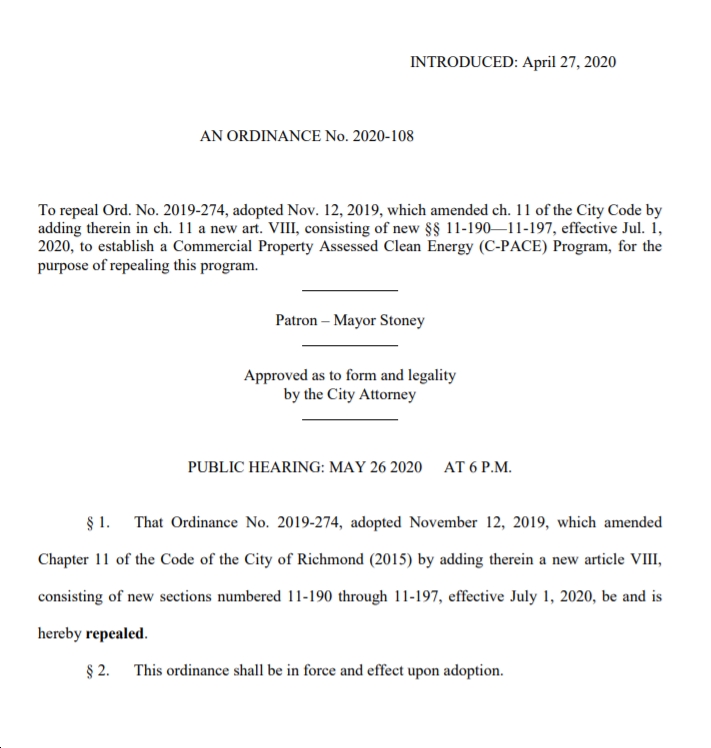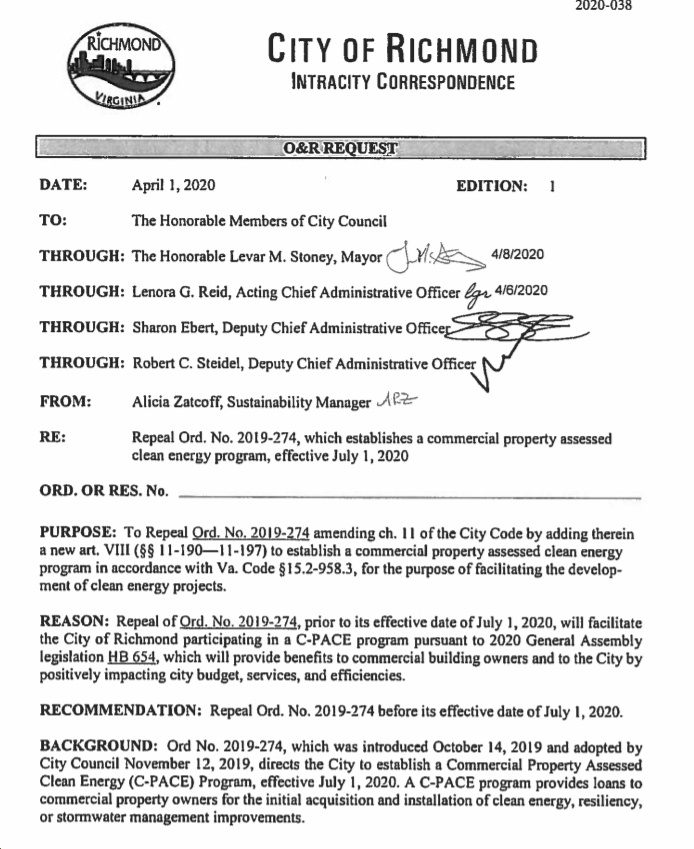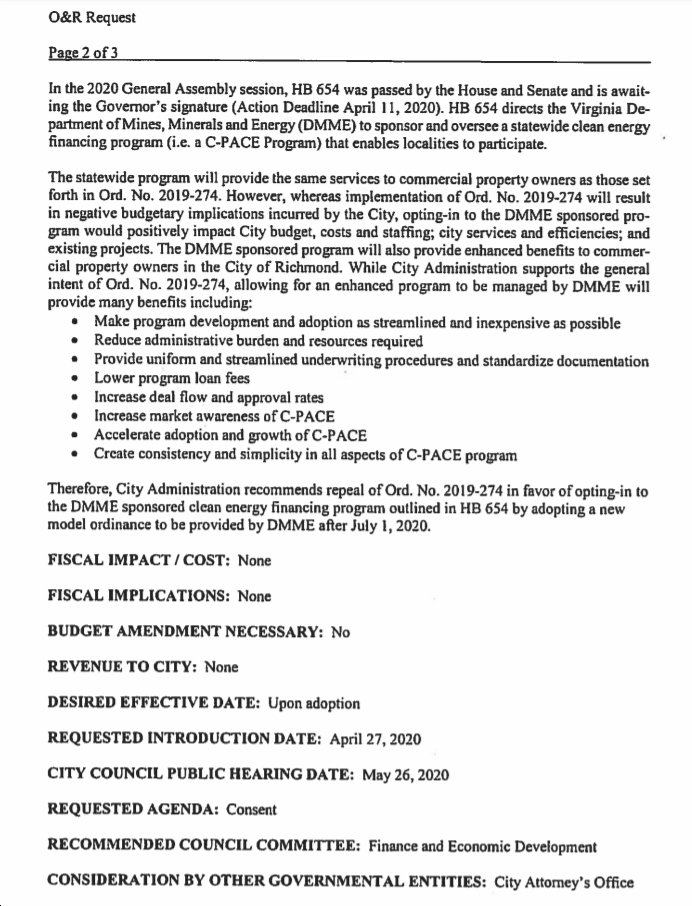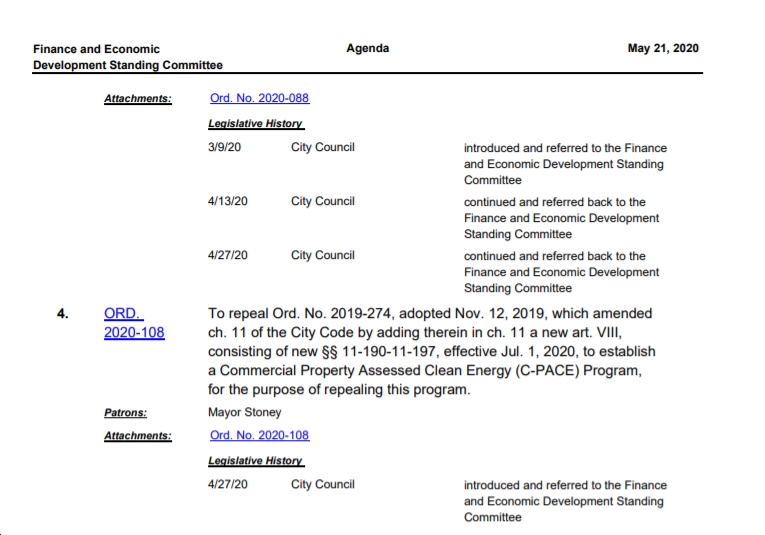by clean energy business professional Bill Greenleaf
In November 2019, the Richmond City Council passed an ordinance approving a Commercial Property Assessed Clean Energy (C-PACE) program. C-PACE is a market-based financing mechanism for owners of commercial property to fund solar, energy efficiency, and resiliency-related property improvements with no upfront costs. But the city failed to put a program in place–despite a streamlined and inexpensive avenue to do so–and now Mayor Stoney’s administration is attempting to repeal the original authorizing ordinance, a move antithetical to their sustainability goals (including Net Zero targets) and to the needs of Richmond’s local economy.
Richmond City Council will vote on the repeal on May 26th.
C-PACE financing originated in California in 2008 and has spread across the country. C-PACE programs are now active in 22 states (37 states have legislation providing for them) and over 2,400 commercial building owners have used C-PACE financing, totaling $1.5 billion in investments and17,000 jobs (www.pacenation.org).
Local governments administer C-PACE programs, enabling property owners to use voluntary special assessments to repay loans. Private lenders make those loans. C-PACE assessments have an advantage over conventional financing because they are attached to the property, rather than to the building owner, and are transferrable upon sale.
After Virginia’s General Assembly passed the C-PACE enabling legislation in 2015, Arlington County, Loudoun County, Fredericksburg, Fairfax County, and Petersburg all launched C-PACE programs. These local governments responded to community demand for access to long-term financing through private lenders for vital building upgrades that lower operating costs, improve performance, and reduce carbon footprints. Some of Richmond’s largest commercial property owners have voiced enthusiastic support for a C-PACE program in the city.
The City of Richmond can quickly launch a C-PACE program without hiring any additional staff by engaging a third-party C-PACE program administrator (just like Loudoun, Arlington, Fairfax, and Petersburg). Richmond could simply work through a cooperative procurement agreement to ride the Loudoun C-PACE program administrator contract.
C-PACE provides economic development benefits to a community by offering innovative financing for energy, water ad resiliency upgrades while also meeting a community’s effort to address greenhouse emissions. C-PACE allows owners of older builders to secure long term financing for much needed property upgrades such as windows, HVAC, lighting retrofits, building automation controls and resiliency measures to address recurrent flooding. The economic benefits extend to the local contractors hired to perform the upgrades.
The city of Richmond will miss an economic development opportunity by abandoning C-PACE. Richmond is home to hundreds of old buildings whose owners could benefit from specialized long-term financing to improve their energy performance and lower their utility costs. The repeal language misleadingly implies that the city is simply foregoing a local program in favor of an eventual state program, but a repeal would not just effectively grind C-PACE to a halt in Richmond, it would negatively effect C-PACE progress elsewhere in the state and nationwide.
Richmond’s C-PACE stakeholder group in Virginia is concerned about the repeal for two primary reasons:
- Repeal would send a message to other local governments in Virginia (and nationally) that there must be something wrong with PACE if Virginia’s capital city saw fit to repeal its own ordinance. It could have a chilling effect, particularly for local governments on the verge of passing a PACE ordinance. We are proposing to the city that it amend the ordinance to extend the placed-in-service date from July 1st (required under the current ordinance) to March 2021; an extension would allow time for the state program to get up and running and avoid the prospect—and negative impact–of repeal.
- It’s doubtful that the state program will get started soon because of the virtually certain budget cuts due to COVID-19. So repealing the ordinance and waiting for the state program to get started would likely delay C-PACE in Richmond for years at best. The city can now use the cooperative procurement language in the Loudoun County PACE program administrator contract to ride their contract and start a program right away.
Instead, for reasons that are not at all transparent, the administration is trying to repeal the C-PACE ordinance without even having a discussion with a stakeholder group. They are blocking a program that would serve their own RVA Green 2050 plan.
We have a chance to save C-PACE in Richmond: Richmonders who support clean energy and economic vitality should ask their city council representative to vote no on repeal on Tuesday, May 26th and to either fully support a C-PACE program as authorized in the existing ordinance or to amend it to extend the placed-in-service date to March 2021.
For more background, Mid-Atlantic PACE Alliance.






![VA DEQ: “pollution from data centers currently makes up a very small but growing percentage of the [NoVA] region’s most harmful air emissions, including CO, NOx and PM2.5”](https://bluevirginia.us/wp-content/uploads/2026/01/noxdatacenters.jpg)

![Thursday News: “Europe draws red line on Greenland after a year of trying to pacify Trump”; “ICE Agent Kills Woman, DHS Tells Obvious, Insane Lies About It”; “Trump’s DOJ sued Virginia. Our attorney general surrendered”; “Political domino effect hits Alexandria as Sen. Ebbin [to resign] to join Spanberger administration”](https://bluevirginia.us/wp-content/uploads/2026/01/montage010826.jpg)
![Sunday News: “Trump Is Briefed on Options for Striking Iran as Protests Continue”; “Trump and Vance Are Fanning the Flames. Again”; “Shooting death of [Renee Good] matters to all of us”; “Fascism or freedom? The choice is yours”](https://bluevirginia.us/wp-content/uploads/2026/01/montage011126.jpg)












